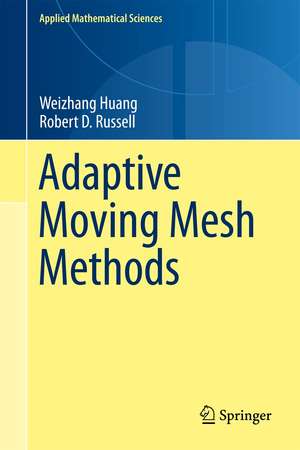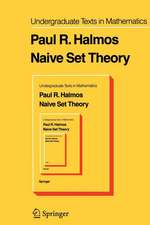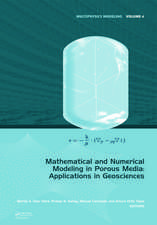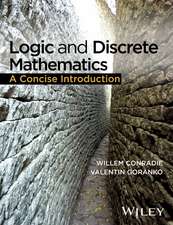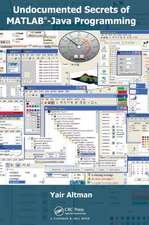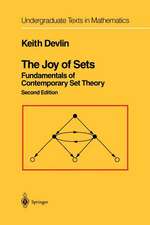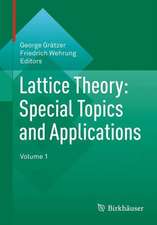Adaptive Moving Mesh Methods: Applied Mathematical Sciences, cartea 174
Autor Weizhang Huang, Robert D. Russellen Limba Engleză Paperback – dec 2012
This book is about adaptive mesh generation and moving mesh methods for the numerical solution of time-dependent partial differential equations. It presents a general framework and theory for adaptive mesh generation and gives a comprehensive treatment of moving mesh methods and their basic components, along with their application for a number of nontrivial physical problems. Many explicit examples with computed figures illustrate the various methods and the effects of parameter choices for those methods. The partial differential equations considered are mainly parabolic (diffusion-dominated, rather than convection-dominated).
The extensive bibliography provides an invaluable guide to the literature in this field. Each chapter contains useful exercises. Graduate students, researchers and practitioners working in this area will benefit from this book.
Weizhang Huang is a Professor in the Department of Mathematics at the University of Kansas.
Robert D. Russell is a Professor in the Department of Mathematics at Simon Fraser University.
| Toate formatele și edițiile | Preț | Express |
|---|---|---|
| Paperback (1) | 397.01 lei 6-8 săpt. | |
| Springer – dec 2012 | 397.01 lei 6-8 săpt. | |
| Hardback (1) | 404.13 lei 6-8 săpt. | |
| Springer – 27 oct 2010 | 404.13 lei 6-8 săpt. |
Din seria Applied Mathematical Sciences
- 13%
 Preț: 426.94 lei
Preț: 426.94 lei - 13%
 Preț: 426.46 lei
Preț: 426.46 lei - 13%
 Preț: 427.63 lei
Preț: 427.63 lei - 24%
 Preț: 906.78 lei
Preț: 906.78 lei - 23%
 Preț: 659.05 lei
Preț: 659.05 lei -
 Preț: 375.64 lei
Preț: 375.64 lei - 18%
 Preț: 909.47 lei
Preț: 909.47 lei - 18%
 Preț: 795.02 lei
Preț: 795.02 lei - 18%
 Preț: 950.52 lei
Preț: 950.52 lei - 15%
 Preț: 645.47 lei
Preț: 645.47 lei - 20%
 Preț: 755.46 lei
Preț: 755.46 lei -
 Preț: 382.65 lei
Preț: 382.65 lei - 24%
 Preț: 808.03 lei
Preț: 808.03 lei -
 Preț: 452.62 lei
Preț: 452.62 lei -
 Preț: 190.23 lei
Preț: 190.23 lei -
 Preț: 399.12 lei
Preț: 399.12 lei - 18%
 Preț: 966.90 lei
Preț: 966.90 lei - 15%
 Preț: 643.48 lei
Preț: 643.48 lei - 15%
 Preț: 528.80 lei
Preț: 528.80 lei -
 Preț: 413.15 lei
Preț: 413.15 lei -
 Preț: 390.25 lei
Preț: 390.25 lei - 18%
 Preț: 736.01 lei
Preț: 736.01 lei - 18%
 Preț: 1411.05 lei
Preț: 1411.05 lei - 15%
 Preț: 711.21 lei
Preț: 711.21 lei -
 Preț: 395.47 lei
Preț: 395.47 lei - 18%
 Preț: 1017.26 lei
Preț: 1017.26 lei -
 Preț: 403.15 lei
Preț: 403.15 lei - 18%
 Preț: 1130.14 lei
Preț: 1130.14 lei - 18%
 Preț: 1134.87 lei
Preț: 1134.87 lei - 18%
 Preț: 1329.00 lei
Preț: 1329.00 lei - 18%
 Preț: 1129.65 lei
Preț: 1129.65 lei - 18%
 Preț: 1140.71 lei
Preț: 1140.71 lei - 15%
 Preț: 653.14 lei
Preț: 653.14 lei
Preț: 397.01 lei
Nou
Puncte Express: 596
Preț estimativ în valută:
75.97€ • 79.32$ • 62.87£
75.97€ • 79.32$ • 62.87£
Carte tipărită la comandă
Livrare economică 05-19 aprilie
Preluare comenzi: 021 569.72.76
Specificații
ISBN-13: 9781461427087
ISBN-10: 1461427088
Pagini: 452
Ilustrații: XVIII, 434 p.
Dimensiuni: 155 x 235 x 24 mm
Greutate: 0.63 kg
Ediția:2011
Editura: Springer
Colecția Springer
Seria Applied Mathematical Sciences
Locul publicării:New York, NY, United States
ISBN-10: 1461427088
Pagini: 452
Ilustrații: XVIII, 434 p.
Dimensiuni: 155 x 235 x 24 mm
Greutate: 0.63 kg
Ediția:2011
Editura: Springer
Colecția Springer
Seria Applied Mathematical Sciences
Locul publicării:New York, NY, United States
Public țintă
GraduateCuprins
Preface.- Introduction.- Adaptive Mesh Movement in 1D.- Discretization of PDEs on Time-Varying Meshes.- Basic Principles of Multidimensional Mesh Adaption.- Monitor Functions.- Variational Mesh Adaptive Methods.- Velocity-Based Adaptive Methods.- Appendix: Sobolev Spaces.- Appendix: Arithmetic Mean Geometric Mean Inequality and Jensen's Inequality.- Bibliography.
Recenzii
From the reviews:
“The authors of the present monograph focus on a brand of strategies for mesh adaption on which they have been working themselves, namely so called r-adaptivity. … It is self-contained, even usable for courses and will guide the reader to much of the current development in the field.” (H. Muthsam, Monatshefte für Mathematik, Vol. 166 (1), April, 2012)
“This book is valuable for both researchers and practitioners working in adaptive moving mesh methods. It presents unified analytical tools and implementation details, and provides applications of the adaptive moving mesh methods. … In addition, the book can be used as a textbook for an advanced course in the numerical solution of partial differential equations.” (Tsu-Fen Chen, Mathematical Reviews, Issue 2012 a)
“This advanced textbook on adaptive mesh generation and moving mesh methods for the numerical solution of time-dependent partial differential equations (mostly of parabolic type) is aimed at graduate students and researchers in the field of scientific computing and numerical analysis. … The book is illustrated with numerous examples, which have been implemented in Matlab.” (Kai Schneider, Zentralblatt MATH, Vol. 1227, 2012)
“The book’s focus is on mesh generation and adaptation through mesh movement techniques … . is completed by an extensive bibliographical list consisting of more than 300 references. … this has helped to fill in the gap between the practitioner’s moving mesh techniques and a sound theoretical background. It is highly accessible and is characterized by a very clear and readable style without sacrificing mathematical rigor and soundness. … a precious reference for a broad community of numerical analysts as well as for computational scientists.” (Alfio Quarteroni, SIAM Review, Vol. 53 (4), 2011)
“The authors of the present monograph focus on a brand of strategies for mesh adaption on which they have been working themselves, namely so called r-adaptivity. … It is self-contained, even usable for courses and will guide the reader to much of the current development in the field.” (H. Muthsam, Monatshefte für Mathematik, Vol. 166 (1), April, 2012)
“This book is valuable for both researchers and practitioners working in adaptive moving mesh methods. It presents unified analytical tools and implementation details, and provides applications of the adaptive moving mesh methods. … In addition, the book can be used as a textbook for an advanced course in the numerical solution of partial differential equations.” (Tsu-Fen Chen, Mathematical Reviews, Issue 2012 a)
“This advanced textbook on adaptive mesh generation and moving mesh methods for the numerical solution of time-dependent partial differential equations (mostly of parabolic type) is aimed at graduate students and researchers in the field of scientific computing and numerical analysis. … The book is illustrated with numerous examples, which have been implemented in Matlab.” (Kai Schneider, Zentralblatt MATH, Vol. 1227, 2012)
“The book’s focus is on mesh generation and adaptation through mesh movement techniques … . is completed by an extensive bibliographical list consisting of more than 300 references. … this has helped to fill in the gap between the practitioner’s moving mesh techniques and a sound theoretical background. It is highly accessible and is characterized by a very clear and readable style without sacrificing mathematical rigor and soundness. … a precious reference for a broad community of numerical analysts as well as for computational scientists.” (Alfio Quarteroni, SIAM Review, Vol. 53 (4), 2011)
Textul de pe ultima copertă
Moving mesh methods are an effective, mesh-adaptation-based approach for the numerical solution of mathematical models of physical phenomena. Currently there exist three main strategies for mesh adaptation, namely, to use mesh subdivision, local high order approximation (sometimes combined with mesh subdivision), and mesh movement. The latter type of adaptive mesh method has been less well studied, both computationally and theoretically.
This book is about adaptive mesh generation and moving mesh methods for the numerical solution of time-dependent partial differential equations. It presents a general framework and theory for adaptive mesh generation and gives a comprehensive treatment of moving mesh methods and their basic components, along with their application for a number of nontrivial physical problems. Many explicit examples with computed figures illustrate the various methods and the effects of parameter choices for those methods. The partial differential equations considered are mainly parabolic (diffusion-dominated, rather than convection-dominated).
The extensive bibliography provides an invaluable guide to the literature in this field. Each chapter contains useful exercises. Graduate students, researchers and practitioners working in this area will benefit from this book.
Weizhang Huang is a Professor in the Department of Mathematics at the University of Kansas.
Robert D. Russell is a Professor in the Department of Mathematics at Simon Fraser University.
This book is about adaptive mesh generation and moving mesh methods for the numerical solution of time-dependent partial differential equations. It presents a general framework and theory for adaptive mesh generation and gives a comprehensive treatment of moving mesh methods and their basic components, along with their application for a number of nontrivial physical problems. Many explicit examples with computed figures illustrate the various methods and the effects of parameter choices for those methods. The partial differential equations considered are mainly parabolic (diffusion-dominated, rather than convection-dominated).
The extensive bibliography provides an invaluable guide to the literature in this field. Each chapter contains useful exercises. Graduate students, researchers and practitioners working in this area will benefit from this book.
Weizhang Huang is a Professor in the Department of Mathematics at the University of Kansas.
Robert D. Russell is a Professor in the Department of Mathematics at Simon Fraser University.
Caracteristici
First ever comprehensive treatment of moving mesh methods for solving time-dependent Partial Differential Equations General error analysis for adaptive mesh generation using equidistribution and alignment is covered Numerous numerical examples and several Matlab codes are included Includes supplementary material: sn.pub/extras
